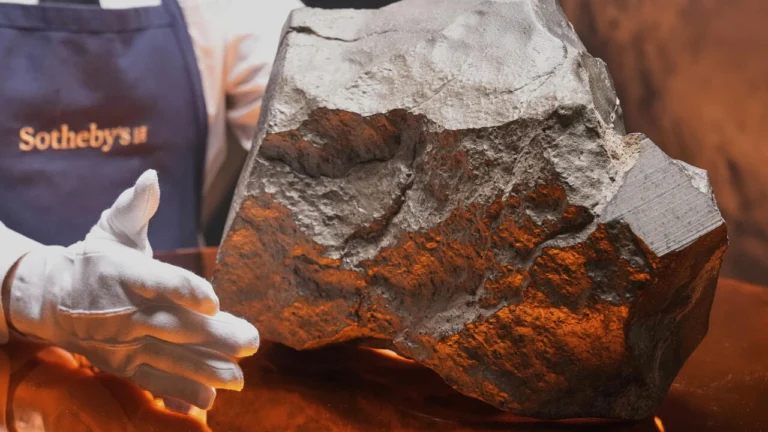Niger Launches Investigation into $5.3 Million Sale of Martian Meteorite in the U.S.
Niger investigates the possible illicit export of a rare Martian meteorite sold in the United States, seeking to determine how the specimen left the country.

A Martian meteorite from Niger’s Ténéré desert was sold for $5.3 million in a Sotheby’s auction in New York. Photo: @XKunmit
July 21, 2025 Hour: 7:12 am
Nigerian authorities have opened an investigation after a meteorite fragment from the Ténéré desert was sold for $5.3 million at a Sotheby’s auction in New York. The government suspects the transaction may involve illegal trafficking and is seeking to determine how the fragment left the country.
RELATED:
Ecuador’s Municipality Declares Emergency After the Murder of 9
On July 18, Niger’s executive branch announced the establishment of a special committee tasked with investigating the recent sale of a Martian meteorite fragment originating from the Agadez region in northern Niger. The meteorite was auctioned on July 16 during Sotheby’s “Geek Week” event in New York, attracting global attention due to its exceptional size and origin.
According to Sotheby’s, the meteorite fragment weighs approximately 24.67 kilograms, making it roughly 70 percent larger than the second-largest known Martian fragment recovered on Earth. Discovered on November 16, 2023, by a meteorite prospector in Agadez, this fragment is part of a rare group: only about 400 of the over 77,000 catalogued meteorites worldwide are confirmed to come from Mars.
Martian meteorites hold significant scientific value, offering insights into the geology of the Red Planet and its history, which adds to their high market demand.
The investigative committee includes Niger’s ministers of Mines, Higher Education, Public Security, and Justice. Its mandate is to clarify key questions such as the identity of the original discoverer, the channels through which the meteorite was exported, and potential complicity among domestic or international actors.
An anonymous mining engineer interviewed by EFE highlighted the investigation’s complexity, noting that it will require “significant financial and logistical resources,” including field missions to Niger’s vast desert regions.
This is not the first incident raising concerns about meteorite trafficking in Niger. In 2011, a meteorite fell in a millet field in Aikaoua, located in the southern Maradi region. Although authorities confirmed its origin, the current whereabouts of the meteorite remain unknown, according to Abdou Rafa, a local community leader.
The case highlights wider challenges faced by countries in the Global South, where valuable natural resources like rare meteorites are often targeted by illicit trade. Protecting these resources is essential to preserve national heritage and ensure fair benefit from their scientific and economic potential.
As Niger advances its investigation, it could set a precedent for stronger oversight of meteorite exports, reinforcing global efforts to prevent illicit trafficking and safeguard natural heritage.
Author: MK
Source: EFE

